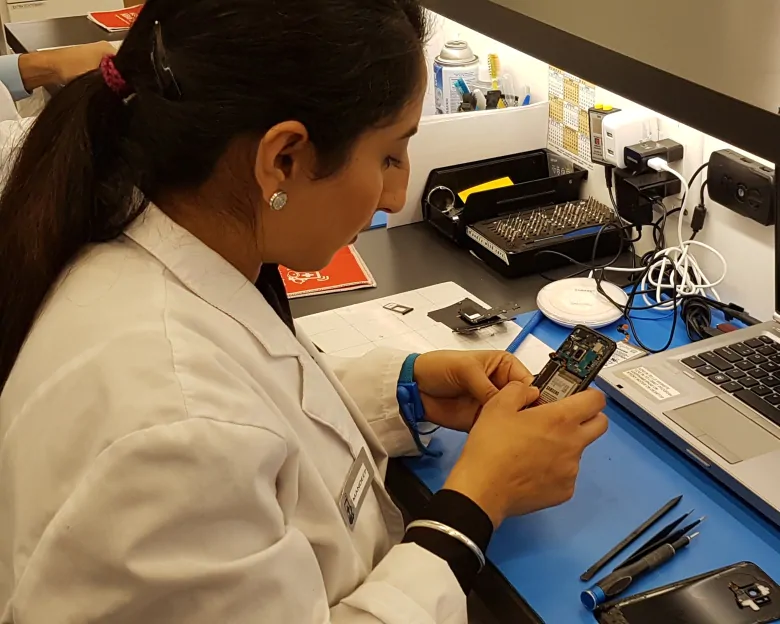Don't buy new, fix the old: The repair business is booming

We’ve all heard the phrase, “They don’t make things like they used to.”
Now a growing number of eco-minded Canadians are deciding that just won’t do. Coffee makers, lamps, toasters and kettles can often be fixed instead of tossed into the trash when they stop working.
“A lot of things these days break quite easily,” says Wai Chu Cheng, the co-founder of Repair Café Toronto, a non-profit organization with 800 volunteers on call, eager to teach people how to fix household items. “People aren’t sure they can repair it themselves, and we show them how.”
The Repair Café holds monthly gatherings, where not only small appliances and other household goods get fixed, but also clothing that needs patches or mending.
When the Repair Café started seven years ago in Canada, there was only one chapter, in Calgary. Now Cheng says there are 47 similar Café organizations in cities across the country providing the same type of services — free. More are coming; Cheng says she’s been getting calls from community groups who want help to set up their own, local repair group.
The cost of replacement has always been a motivation to have things repaired, but nowadays Cheng says climate and waste concerns are driving a surge in interest, particularly with young people.
Anita Neufeld came to a recent Repair Café with a broken tape deck. “The main reason for me to fix things is to be able to reuse stuff and keep it out of the landfill.”
Make it last longer
For-profit companies are also on top of the trend. Tim McGuire is CEO of Mobile Klinik, a chain of 80 stores that repair mobile devices in malls and Walmart locations across the country. He points out that the chain was recently ranked as the 12th fastest growing company in Canada, with plans to have 200 locations coast to coast within the next three years.
“There are a lot of people that would like to get more years out of an electronic device, rather than putting it into a landfill,” he says.

McGuire says it’s not uncommon for manufacturers to advise consumers to buy a new device, instead of having an old one fixed. But it appears many people are loath to incur that expense or to contribute to Canada’s waste situation.
“If you go back two years, the average phone lasted about two and a quarter years. Now customers are keeping their phones for over three years, and we see that continuing to increase every year,” he says.
Planned obsolescence
At a recent Repair Café event, some of those in attendance blamed manufacturers for building devices with “planned obsolescence” in mind, in order to boost sales.
“They’re made to be broken,” says Paul Magder, one of the co-founders of the Toronto chapter. “They’re made to be thrown out, to make money for the manufacturers. That’s their business model.”
Magder, who once worked in the manufacturing sector, says it’s all about cost. “They use plastic parts, cheap parts and then they break. If they have to use metal parts it’ll be more expensive, but then it will last longer.”
Consumers, however, are highly price-sensitive, and manufacturers focus on keeping prices as low as possible, in order to compete.
Manufacturers say repair is risky
In a statement provided to CBC News the Association of Home Appliance Manufacturers cautions, “An untrained or uncertified person performing a repair may not be aware of or understand how to ensure an appliance continues to meet the various safety standards required to keep Canadians safe.”

Michael Coteau is a member of the Ontario Legislature who introduced a private member’s bill last year, proposing a requirement for manufacturers to make parts and repair instructions widely available. But as a Liberal-sponsored bill, it was promptly voted down by Ontario’s Conservative majority government.
“My father is a washing machine repairman,” says Coteau. “That’s what he’s done his whole life. As consumers, as Ontarians, as Canadians, we need to make sure that as we move along in this age of advancement in technology, we have control of our devices.’
Coteau points out that the European Union parliament is on course to pass “right to repair” legislation, specifying the number of years a manufacturer must make reasonably priced parts available, among other measures to promote repairability in appliances. In addition, 20 American states are considering similar legislation, according to the Washington-based Public Interest Research Group.
Industry groups push back
But Coteau says that shortly after he tabled his bill, a delegation from the tech industry arrived in his Queen’s Park office. “It was a whole industry group, and they came in and sat down to make a counter argument to the right to repair movement, saying that it was dangerous for people to open up their products.” The group also made an argument about compromising intellectual property.
“I don’t think it’s reasonable,” says Coteau. He’s considering reintroducing his bill.
But many Canadians aren’t waiting for legislation or for manufacturers to act. They’re helping each other at events like the Repair Café gathering in Toronto.
“I have a pair of probably 20-year-old jeans that are being repaired,” explained Brian Brenie, as a fixer showed him how to patch his favourite denim. “They’re so comfortable, I just can’t get rid of them and I don’t want to throw them away, so I always come to the Repair Café to get these types of things done.”
Charmaine Iding came to the Café to get her phone fixed, and got a necklace restrung while she was there. “The real problem is in design where they don’t make things to be fixed — they make things to be obsolete, so people will keep consuming. That is the real problem.”





